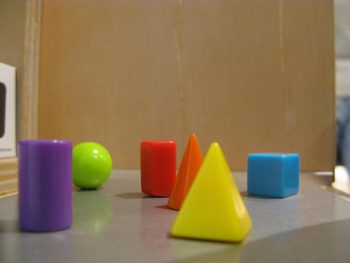German Vocabulary Shapes Posted by Larissa on Jun 26, 2018 in Language, Uncategorized
Sometimes it’s the most simplest of words that you don’t know in a different language, I found myself the other day wondering what a rectangle was in German – which inspired me to write this post! Here’s some easy vocabulary about shapes in German.
Let’s start with the basics:
Shape(s) die Form(en)
Circle der Kreis
Semi circle der Halbkreis (literal translation is “the half circle”, an easy one to remember!)
Square das Viereck OR das Quadrat
Triangle das Dreieck
Rectangle das Rechteck
Four shapes that are exactly the same as in English (so you don’t have to learn anything new):
Rhombus der Rhombus
Trapezoid das Trapezoid
Oval das Oval
Trapez das Trapez
Note that square and triangle always have “eck” at the end of the word. Eck means corner. So if any shape has a corner you can guess that it ends in eck!
These shapes are easier to remember in German as the number changes and then you just add the eck on the end:
Triangle das Dreieck
Square das Viereck
Pentagon das Fünfeck
Hexagon das Sechseck
Heptagon das Siebeneck
Octagon das Achteck
Nonagon das Neuneck
Decagon das Zehneck
Different types of triangles:
Equilateral (All sides are the same length) gleichseitiges Dreieck
Right triangles (There is one right angle) rechtwinkliges Dreieck
Iscoceles triangles (Two sides are the same length) unregelmäßiges Dreieck
3D Shapes
Cube der Würfel
Pyramid die Pyramide
Cylinder der Zylinder
Ball die Kugel
Cone der Kegel
Prism das Prisma
Rectangular prism der Quader
Sometimes it’s nice when German is so literal, as it makes it easier to remember. I actually needed a reminder what some of the shapes were called in English once they had more than eight sides! Let me know if you have any other shapes which you don’t know in German.
Servus,
Larissa

Build vocabulary, practice pronunciation, and more with Transparent Language Online. Available anytime, anywhere, on any device.





Comments:
Karen:
Hallo Larissa!
Danke für that post on an unusual but interesting lesson 🙂
Constanze:
I love it!!!!!!!
Etienne:
Hallo Larissa,
thank you for this post, it’s really useful.
However i noticed two little mistakes:
a equilateral triangle has his 3 sides of the same length
a isocele has two sides of the same length
Danke noch
Larissa:
@Etienne Woops thank you! I was getting confused at all the triangles, I’ll update the post now 🙂
Larissa
Stephen:
An isosceles triangle has two sides that are the same length. A triangle with no equal sides is called a scalene triangle.
Sally:
Thanks for this post! How about including “point, line, & curve” and / or “angle & side” vocabulary so we can talk about these shapes?
Lisa Gorrell:
Shouldn’t a Nonagon be das Neuneck? It has nine sides.
Larissa:
@Lisa Gorrell Good that you spotted this! I didn’t mean for it to be a “neineck” – a “no corner” haha 🙂
Thanks for reading,
Larissa